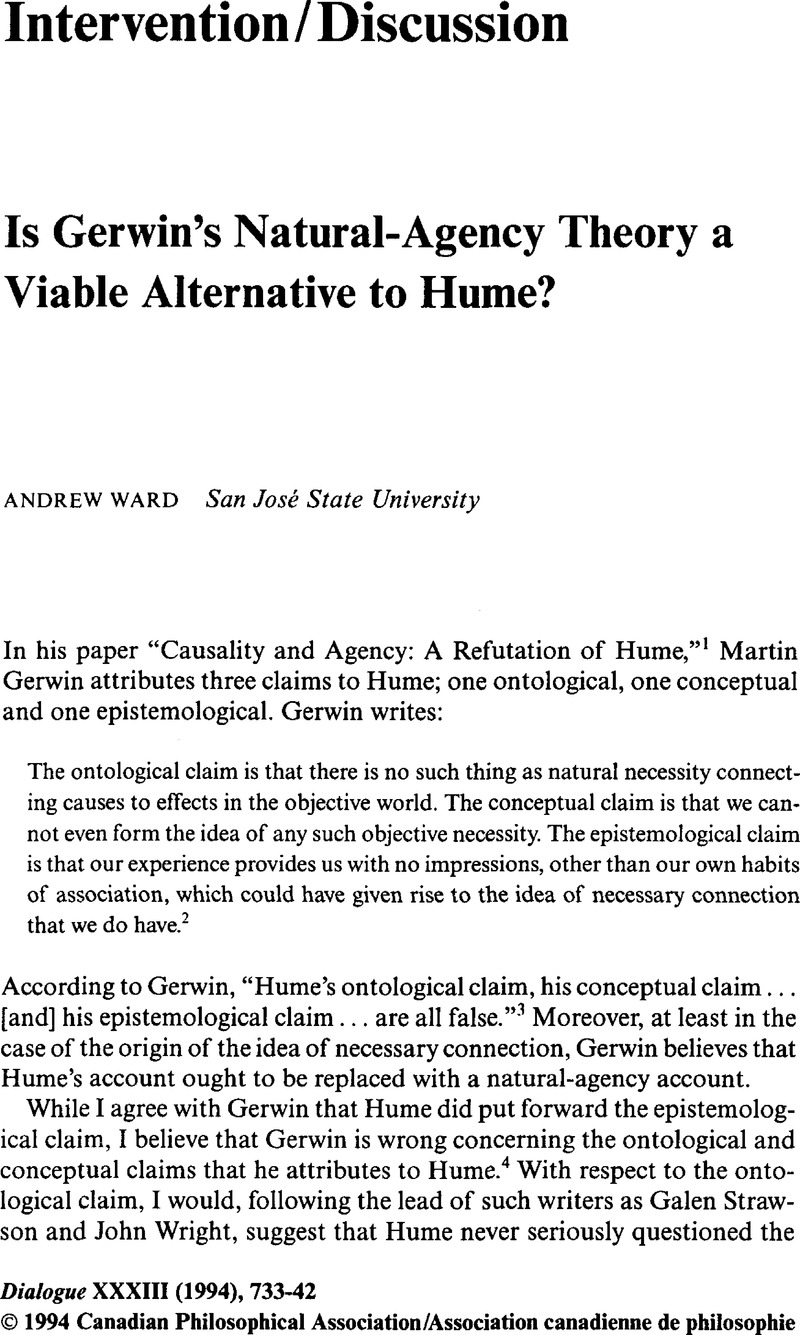Article contents
Is Gerwin's Natural-Agency Theory a Viable Alternative to Hume?
Published online by Cambridge University Press: 13 April 2010
Abstract

- Type
- Intervention/Discussion
- Information
- Dialogue: Canadian Philosophical Review / Revue canadienne de philosophie , Volume 33 , Issue 4 , Fall 1994 , pp. 733 - 742
- Copyright
- Copyright © Canadian Philosophical Association 1994
References
Notes
1 Gerwin, Martin, “Causality and Agency: A Refutation of Hume,” Dialogue, 26, 1 (Spring 1987).CrossRefGoogle Scholar
2 Ibid., p. 4
3 Ibid., p. 5.
4 Gerwin's reading of Hume is not unusual. See, for example, Bennett, Jonathan, Locke, Berkeley, Hume: Central Themes (Oxford: Clarendon Press, 1971), p. 296Google Scholar; Flew, Anthony, Hume's Philosophy of Belief (London: Routledge and Kegan Paul, 1961), p. 123Google Scholar; and Stroud, Barry, Hume (London: Routledge and Kegan Paul, 1981), p. 86.Google Scholar
5 See, for example, Craig, E. J., The Mind of God and the Works of Man (Oxford: Clarendon Press, 1987)Google Scholar; Livingston, Donald, Hume's Philosophy of Common Life (Chicago: University of Chicago Press, 1984)Google Scholar; Strawson, Galen, The Secret Connexion: Causation, Realism and David Hume (Oxford: Clarendon Press, 1989)Google Scholar; and Wright, John, The Sceptical Realism of David Hume (Manchester: Manchester University Press, 1983).Google Scholar
6 Hume, David, A Treatise of Human Nature, 2nd ed., edited by Selby-Bigge, L. A., revised by P. H. Nidditch (Oxford: Clarendon Press, 1978), p. 68.Google Scholar
7 Hume, David, Enquiries Concerning Human Understanding and Concerning the Principles of Morals, 3rd ed., edited by Selby-Bigge, L. A., revised by P. H. Nidditch (Oxford: Clarendon Press, 1982), p. 77, n.1.Google Scholar
8 See Flage, Daniel, “Hume's Relative Ideas,” Hume Studies, 7, 1 (April 1981): 55–73Google Scholar; Livingston, Hume's Philosophy of Common Life, pp. 80ff.; Strawson, The Secret Connexion, pp. 50ff.
9 Gerwin, “Causality and Agency,” p. 7.
10 Ibid., p. 9.
11 Ibid.
12 Ibid., p. 10.
13 Ibid.
14 Ibid. Also see p. 15.
15 Ibid., p. 10.
16 Ibid., my emphasis.
17 Ibid.
18 What Hume means by ‘objects’ is a difficult exegetical issue. In what follows I will use ‘objects’ and ‘events’ interchangeably. For a discussion of some of thecomplexities, see Strawson, The Secret Connexion, chaps. 4 and 6.
19 Hume, Treatise, p. 163. Also see Hume, Treatise, pp. 164–66, and Hume, Enquiry, p. 63.
20 As Edwards, Jonathan, Freedom of the Will, edited by Ramsey, Paul (New Haven, CT: Yale University Press, 1957), p. 352, writes: “All men find, and begin to find early in childhood, that there are innumerable things that can’t be done, which they desire to do; and innumerable things which they are averse to, that must be, they can’t avoid them, they will be, whether they choose them or no. Tis to express this necessity, which men so soon and so often find, and which so greatly and so early affects them in innumerable cases, that such terms and phrases [e.g., ‘must’, ‘can’t’, ‘can’t help it’, ‘can’t avoid it’, ‘necessary’, ‘impossible’, etc.] are first formed; and ‘tis to signify such a necessity, that they are first used, and that they are most constantly used, in common affairs of life “Google Scholar
21 Hume, Enquiry, p. 68.
22 Hume, Treatise, p. 170.
23 For Hume, to be acquainted with the idea of power is also to be acquainted with the idea of necessary connection. See, for example, Enquiry, pp. 63ff, and Treatise, p. 157, where Hume says: “I begin with observing that the terms of efficacy, agency, power, force, energy, necessity, connexion, and productive quality, are all nearly synonimous.…” Also see Hume, Treatise, p. 258.
24 Hume, Enquiry, p. 67.
25 Ibid., p. 64.
26 Gerwin, “Causality and Agency,” p. 10.
27 Hume, Enquiry, p. 64.
28 Ibid.
29 Ibid., pp. 64–70.
30 Ibid., p. 66.
31 Ibid., p. 67.
32 Ibid.
33 Ibid., p. 86.
34 See Hume, Enquiry, p. 68, and Treatise, pp. 632–33.
35 Gerwin, “Causality and Agency,” p. 10.
36 Ibid.
37 Ibid.
38 Ibid., p. 7.
39 Hume, Treatise, p. 632, my emphasis.
40 Gerwin, “Causality and Agency,” p. 10.
41 Bennett, Locke, Berkeley, Hume, pp. 261f.
42 Gerwin, “Causality and Agency,” p. 10.
43 Ibid.
44 Ibid., p. 11.
45 Ibid., p. 10–11.
46 Ibid., p. 9.
47 Ibid., p. 10.
48 Ibid., p. 11.
- 1
- Cited by




